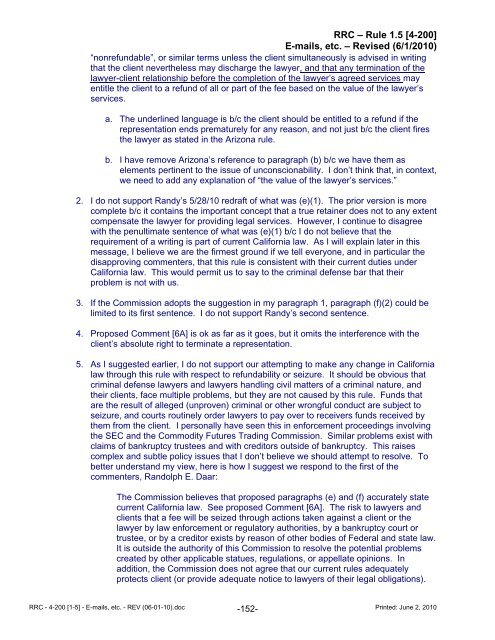Sorted by Commenter - Ethics - State of California
Sorted by Commenter - Ethics - State of California
Sorted by Commenter - Ethics - State of California
You also want an ePaper? Increase the reach of your titles
YUMPU automatically turns print PDFs into web optimized ePapers that Google loves.
RRC – Rule 1.5 [4-200]<br />
E-mails, etc. – Revised (6/1/2010)<br />
“nonrefundable”, or similar terms unless the client simultaneously is advised in writing<br />
that the client nevertheless may discharge the lawyer, and that any termination <strong>of</strong> the<br />
lawyer-client relationship before the completion <strong>of</strong> the lawyer’s agreed services may<br />
entitle the client to a refund <strong>of</strong> all or part <strong>of</strong> the fee based on the value <strong>of</strong> the lawyer’s<br />
services.<br />
a. The underlined language is b/c the client should be entitled to a refund if the<br />
representation ends prematurely for any reason, and not just b/c the client fires<br />
the lawyer as stated in the Arizona rule.<br />
b. I have remove Arizona’s reference to paragraph (b) b/c we have them as<br />
elements pertinent to the issue <strong>of</strong> unconscionability. I don’t think that, in context,<br />
we need to add any explanation <strong>of</strong> “the value <strong>of</strong> the lawyer’s services.”<br />
2. I do not support Randy’s 5/28/10 redraft <strong>of</strong> what was (e)(1). The prior version is more<br />
complete b/c it contains the important concept that a true retainer does not to any extent<br />
compensate the lawyer for providing legal services. However, I continue to disagree<br />
with the penultimate sentence <strong>of</strong> what was (e)(1) b/c I do not believe that the<br />
requirement <strong>of</strong> a writing is part <strong>of</strong> current <strong>California</strong> law. As I will explain later in this<br />
message, I believe we are the firmest ground if we tell everyone, and in particular the<br />
disapproving commenters, that this rule is consistent with their current duties under<br />
<strong>California</strong> law. This would permit us to say to the criminal defense bar that their<br />
problem is not with us.<br />
3. If the Commission adopts the suggestion in my paragraph 1, paragraph (f)(2) could be<br />
limited to its first sentence. I do not support Randy’s second sentence.<br />
4. Proposed Comment [6A] is ok as far as it goes, but it omits the interference with the<br />
client’s absolute right to terminate a representation.<br />
5. As I suggested earlier, I do not support our attempting to make any change in <strong>California</strong><br />
law through this rule with respect to refundability or seizure. It should be obvious that<br />
criminal defense lawyers and lawyers handling civil matters <strong>of</strong> a criminal nature, and<br />
their clients, face multiple problems, but they are not caused <strong>by</strong> this rule. Funds that<br />
are the result <strong>of</strong> alleged (unproven) criminal or other wrongful conduct are subject to<br />
seizure, and courts routinely order lawyers to pay over to receivers funds received <strong>by</strong><br />
them from the client. I personally have seen this in enforcement proceedings involving<br />
the SEC and the Commodity Futures Trading Commission. Similar problems exist with<br />
claims <strong>of</strong> bankruptcy trustees and with creditors outside <strong>of</strong> bankruptcy. This raises<br />
complex and subtle policy issues that I don’t believe we should attempt to resolve. To<br />
better understand my view, here is how I suggest we respond to the first <strong>of</strong> the<br />
commenters, Randolph E. Daar:<br />
The Commission believes that proposed paragraphs (e) and (f) accurately state<br />
current <strong>California</strong> law. See proposed Comment [6A]. The risk to lawyers and<br />
clients that a fee will be seized through actions taken against a client or the<br />
lawyer <strong>by</strong> law enforcement or regulatory authorities, <strong>by</strong> a bankruptcy court or<br />
trustee, or <strong>by</strong> a creditor exists <strong>by</strong> reason <strong>of</strong> other bodies <strong>of</strong> Federal and state law.<br />
It is outside the authority <strong>of</strong> this Commission to resolve the potential problems<br />
created <strong>by</strong> other applicable statues, regulations, or appellate opinions. In<br />
addition, the Commission does not agree that our current rules adequately<br />
protects client (or provide adequate notice to lawyers <strong>of</strong> their legal obligations).<br />
RRC - 4-200 [1-5] - E-mails, etc. - REV (06-01-10).doc -152-<br />
Printed: June 2, 2010












![Proposed Rule 4.1 [N/A] “Truthfulness in Statements to Others” - Ethics](https://img.yumpu.com/19037854/1/190x245/proposed-rule-41-n-a-truthfulness-in-statements-to-others-ethics.jpg?quality=85)



